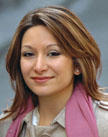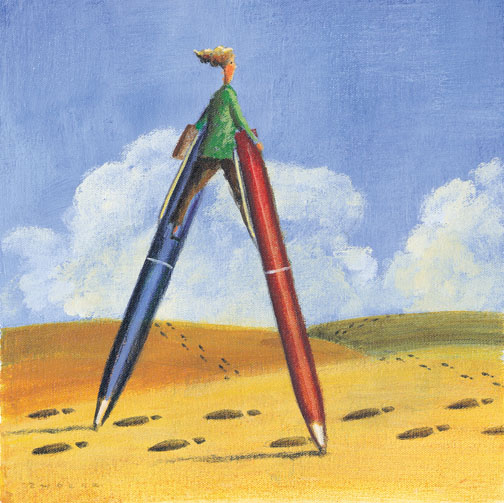
Dina Nayeri Viergutz ’01 is the co-author of the novel Another Faust, which was released in August by Candlewick Press. It is the first in her series of classic retellings set in a modern New York high school.
You shouldn’t major in economics.” Sociology professor Miguel Centeno was the first person to tell me that flat out. It’s not the kind of thing professors allow themselves to say to students. It’s so definite. What if they’re wrong? What if their influence steers the student down a difficult path? So maybe I should have taken his willingness to say those words as a sign. I also should have noticed that Professor Centeno, my favorite teacher, the most thoughtful of advisers, had just walked me to class 10 minutes out of his way, and that he was trying to tell me something really important.
Dina, you seem really passionate about literature.
Dina, I promise McKinsey does hire English majors.
Dina, do you like doing econ, or is it just that you’re good at it?
I wasn’t listening. I was too busy wondering if that other hard-core econ girl had beaten me out of my summer internship with her slightly shinier black portfolio (not orange like mine) and her more sensible, office-appropriate leather pumps. I was calculating my first-year bonus. I was drafting a glittering résumé of McKinseys and Goldmans and M.B.A.s that would make that other girl choke on her drink at some future cocktail party.
When he finished talking, I made up an excuse about how my parents wanted me to major in econ. I think Professor Centeno knew I was lying. I went to my econ class and tucked that conversation away in some corner of my memory until years later — at Harvard Business School — it crept back out and started to nag me.
I chose economics because it was safe and led to all the right places. Because it was challenging and I was good at it. Because there was absolutely no downside to it. Econ at Princeton, McKinsey, HBS. Can’t go wrong with that. People said that all the time, and only as a side note did anyone bother to add, “But only if that’s what you enjoy.” What does that mean? I said to myself. Are you asking me if I’ve got what it takes? Are you asking me if I can? Well, then — hell, yeah.
I wish someone had told the competitive, I-can-too Dina that writing also is a thorny path that can lead to validation and glory. That might have piqued my interest and caused me to choose the right major, even if for all the wrong reasons.
Every semester for my entire career at Princeton, I took a literature class for fun. “American Bestsellers.” “Modern Fiction.” “Modern Drama.” Once, as I was writing a paper in the Tower computer cluster, I joked with my friends in the economics department about the subjectivity of English papers — about how I could get an “A” just by claiming that I saw signs of some underlying sexual deviance. The thing I failed to mention to them is that I spent six hours on that paper. I threw myself into it as I hadn’t done with any other assignment. I got a B+ and then rewrote it, though the preceptor told me my new grade wouldn’t count for anything except personal satisfaction ... and yes, there really were signs of underlying sexual deviance in that novel.
Back then I didn’t spend much time thinking about how differently I approached my English classes and my econ classes. While I enjoyed economics, I rarely spent more than an hour on a problem set. If I did, it was out of fear for my grades. I never spent much time thinking about the work, because it wasn’t fun the way it was fun to reread my English notes and write alternate endings in the margins of novels. That didn’t matter, though, because I needed econ to get me where I was going. The econ-McKinsey-HBS path was too shiny a prize. And fiction was just a hobby.
When I finally realized that I should be a writer, I was five years out of college and in my second year at Harvard Business School. I realized it when I was sitting in the only literature class HBS offered: “The Moral Leader,” which applied moral dilemmas from modern fiction to business settings. I devoured that class, read every assignment, wrote up my thoughts without handing them in. And then a light went on in my head: Oh God, I’ve made a mistake.
That talk with Professor Centeno came rushing back to me, and I did some investigating (with the help of Facebook) into my own path and those of my friends.
Yes, McKinsey did hire plenty of English majors.
Yes, I am really passionate about literature.
Yes, I did take econ only because I was good at it.
So I decided to become a writer. Man, was it hard. I had to relearn everything, knock on doors unprepared, be rejected more times than I had ever been in my life. At one point, I was the oldest student in a Harvard undergraduate writing seminar. In the end, I eked out an education that I should have gotten in college. At Princeton they tell you, “Choose a concentration that sparks your passion. You can do whatever you want with a liberal arts degree.” Which is University-speak for this:
We know that at first you’re going to pick the money jobs and the glittery companies and the résumé boosters. So get a degree in what you love — that way, when you come to your senses at 30, you can go back to where you belong without too much of a headache.
If I could go back and talk to my 20-year-old self, I would say, “Stop taking economics classes! Look, there’s Joyce Carol Oates! Go and show her your stories. She won’t come with you to the real world!”
I’m sure many others made decisions similar to mine. Princeton students tend to be good at many things, and they love having their talent reaffirmed. It’s hard to separate that rush from genuine passion. But sometimes, the most difficult subjects are the best fit, because what makes them hard is the personal longing to master them — whether or not you’re the superstar.












No responses yet